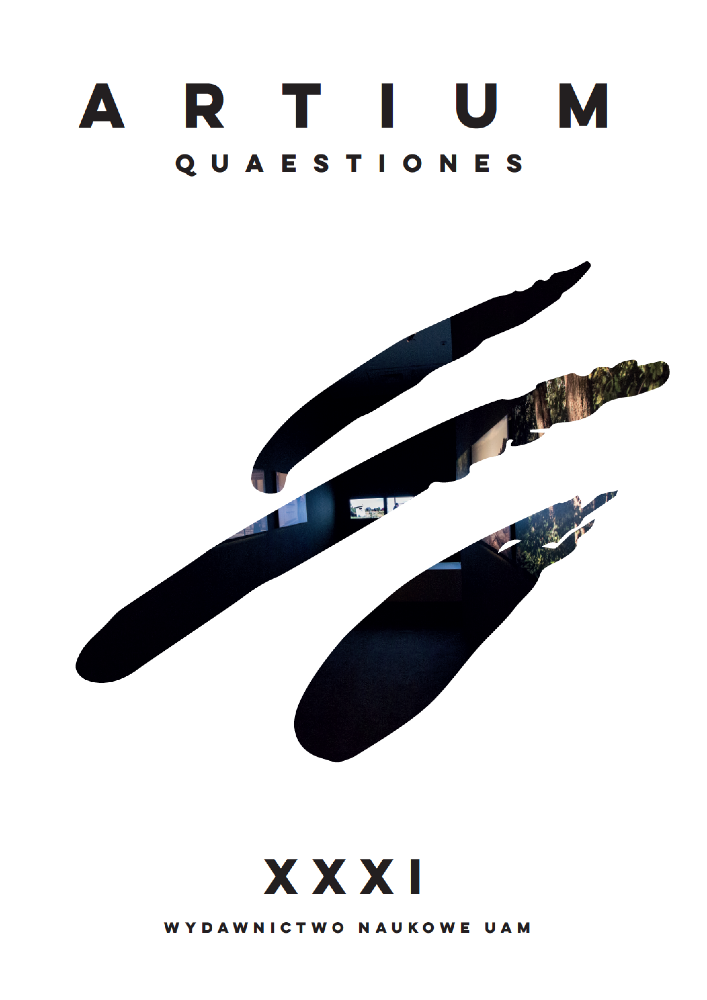Abstract
The subject of the paper is a painting by Artur Grottger, which has not yet been the subject of close art historical analysis, hindered by the complicated history of the painting as a material object: from its creation (1861–63) and being exhibited in Vienesse Kunstverein in 1864 (titled Das Gebet vor der Schlacht. Episode aus der vergangenen Zeit in Polen), via its appearances and disappearances in the arena of history, till its present status of an object in a private collection, whichlimits its accessibility. The reconstruction of the process of constituting its present title (The Bar Confederates Pray Before the Battle of Lanckorona), reveals the problematic status of the reference to the specific battle fought during the Bar Confederation (1768–1772). The confrontation of the pictorial presentation with a real course of the battle of Lanckorona (23 May 1771) proves that it was not Grottger’s imperative to reconstruct in a probabilistic manner neither the place nor the course of the specific historical event. The analysis of the common for the artist and its public cultural competence, whose basis during that epoch was literature, does not yield an unequivocal identification of specific historical figures or literary motifs as references for the painting. This probabilism of heteronomous, historical and literary references, increases the autonomy of Grottger’s painting as a visual medium. Following the tenet of art historical hermeneutics that it is not contextual references but the pictorial potential activated by the artist that defines the actual status of the represented event, the subject of the next part of the text is the vision-oriented logic of the painting. The main reference is Michael Brötje’s theory, according to which the surface of the painting (not the material, covered with paint, picture plane – die Flache – but immaterial, invisible instance – die Ebene) constitutes the ultimate instance for both represented reality, which it transcends and whose boundaries it establishes, and for the spectator, who confronts this reality in the process of viewing with the pictorial surface and its boundaries. In the process of viewing, which consists in the interaction between structural properties of the painting and the postulated by the viewer relating to the surface, the spectator experiences, as his or her own, the truth about the confederates’ origin, their connection with nature, their religiosity, rootedness in the motherland, death as their destiny, and their devotion to the ultimate absolute instance. The very experience, residing in the medium, ultimately determines the status of the heteronomous in relation to the painting, historical and literary references.
References
Arthur i Wanda. Dzieje miłości Arthura Grottgera i Wandy Monné. Listy – Pamiętniki, podali do druku M. Wolska i M. Pawlikowski, t. 1–2, Medyka–Kraków 1928
Artur Grottger (1837–1867), oprac. P. Łukaszewicz, Wrocław 1987
Bołoz Antoniewicz J., Grottger, Lwów 1910
Bryl M., Cykle Artura Grottgera. Poetyka i recepcja, Poznań 1994
Dobrowolski T., Artur Grottger (1837–1867), Kraków 1970
Grottger, oprac. Z. Gołubiew, A. Król, Kraków 1988
Judkowiak B., „Kantata na dzień imienin JW Hilarego Siemianowskiego” na tle twórczości Stanisława Kostki Potockiego, w: O spuściźnie literackiej Stanisława Kostki
Potockiego. Studia i szkice, red. D. Folga-Januszewska i T. Chachulski, Warszawa 2018, s. 63–67
Kantecki K., Artur Grottger. Szkic biograficzny, Lwów 1879
Konfederacja barska. Wybór tekstów, wstęp i objaśnienia W. Konopczyński, Wrocław 2004
Konopczyński W., Konfederacja barska. Przebieg, tajemne cele i jawne skutki, t. 1–2, Poznań 2017
Król A., Artur Grottger [kat. wyst.], Szczecin 2001
Literatura Konfederacji Barskiej, red. J. Maciejewski, A. Bąbel, A. Grabowska-Kuniczuk, J. Wójcicki, t. 1: Dramaty, Warszawa 2005; t. 2: Dialogi, Warszawa 2005;
t. 3: Wiersze, Warszawa 2008; t. 4: Silva Rerum, Warszawa 2008
Łepkowski J., Kalwaria Zebrzydowska, Kraków 1850
Pol W., Mohort, wstępem i objaśnieniami zaopatrzył A. Łucki, Kraków 1922
Potocki A., Grottger, Kraków 1906
Puciata-Pawłowska J., Artur Grottger, Toruń 1962
Rutowski T., Prof. Antoniewicz o Grottgerze, Lwów 1911
Rzewuski H., Pamiątki Soplicy, oprac. Z. Szweykowski, Wrocław 2009
Sadowski P., Konfederacja barska w starostwie lanckorońskim, „Zeszyty Sądecko-Spiskie” 2008, 3, s. 52–69
Stasiak A.M., Legenda bitwy lanckorońskiej, „Zeszyty Sądecko-Spiskie” 2008, 3, s. 71–76
Szczepański A., Artur Grotger. Ustęp z dziejów sztuki polskiej, Kraków 1868
Szlak Konfederatów Barskich. Lanckorona jednym z głównych bastionów Konfederacji Barskiej, Lanckorona [b.d.]
Tarnowski S., Chopin i Grottger. Dwa szkice, Kraków 1892
Waśko A., Recepcja „Historii anarchii” Claude’a Carlomana Rulhière’a w literaturze polskiej (lata 1807–1862), w: Konfederacja barska, jej konteksty i tradycje, red. A. Buchmann, A. Daniczyk, Warszawa 2010, s. 69–83
Wystawa dzieł Artura Grottgera w setną rocznicę urodzin 1937–1867 [kat. wyst.], Kraków 1937
License
Copyright (c) 2020 Mariusz Bryl

This work is licensed under a Creative Commons Attribution-NonCommercial-NoDerivatives 4.0 International License.
The copyrights are regulated by author's statement and publication agreement prepared by Adam Mickiewicz University Press. The authors are responsible for the originality of texts published and regulating the copyrights of accompanying visual materials, unless the materials come from the Editorial Team.
This work is available with the following licence: Attribution-NonCommercial-NoDerivatives 4.0 International License
Attribution-NonCommercial-NoDerivatives 4.0 International License

